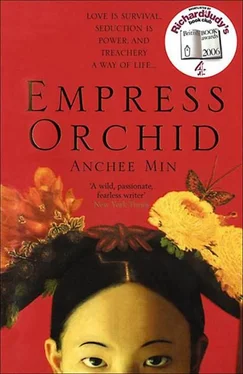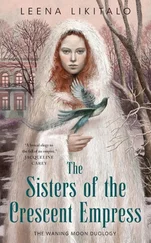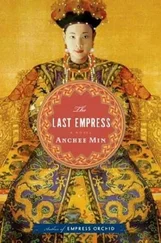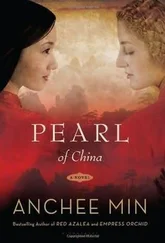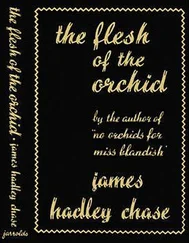In my memory, my father was not a happy man. He had been repeatedly demoted because of his poor performance in the suppression of the Taiping peasant uprisings. Not until later did I learn that my father was not totally to blame. For years China had been dogged by famine and foreign aggression. Anyone who tried on my father’s shoes would understand that carrying out the Emperor’s order to restore peace in the countryside was impossible-peasants saw their lives as no better than death.
I witnessed my father’s struggles and sufferings at a young age. I was born and raised in Anhwei, the poorest province in China. We didn’t live in poverty, but I was aware that my neighbors had eaten earthworms for dinner and had sold their children to pay off debts. My father’s slow journey to hell and my mother’s effort to fight it occupied my childhood. Like a long-armed cricket my mother tried to block a carriage from running over her family.
The summer heat baked the path. The coffin was carried in a tilted position because the footmen were of different heights. Mother imag-ined how uncomfortable my father must be lying inside. We walked in silence and listened to the sound of our broken shoes tapping the dirt. Swarms of flies chased the coffin. Each time the footmen paused for a break the flies covered the lid like a blanket. Mother asked my sister Rong, my brother Kuei Hsiang and me to keep the flies away. But we were too exhausted to lift our arms. We had been traveling north along the Grand Canal on foot because we had no money to hire a boat. My feet were covered with blisters. The landscape on both sides of the path was bleak. The water in the canal was low and dirt-brown. Beyond it were barren hills, which extended mile after mile. There were fewer inns to be seen. The ones that we did come upon were infested with lice.
“You’d better pay us,” the head footman said to Mother when he heard her complaint that her wallet was near empty, “or you will have to carry the coffin yourselves, madam.” Mother began to sob again and said that her husband didn’t deserve this. She gained no sympathy. The next dawn the footmen abandoned the coffin.
Mother sat down on a rock by the road. She had a ring of sores sprouting around her mouth. Rong and Kuei Hsiang discussed burying our father where he was. I didn’t have the heart to leave him in a place without a tree in sight. Although I was not my father’s favorite at first-he was disappointed that I, his firstborn, was not a son-he did his best in raising me. It was he who insisted that I learn to read. I had no formal schooling, but I developed enough of a vocabulary to figure out the stories of the Ming and Ch’ing classics.
At the age of five I thought that being born in the Year of the Sheep was bad luck. I told my father that my friends in the village said that my birth sign was an inauspicious one. It meant that I would be slaughtered.
Father disagreed. “The sheep is a most adorable creature,” he said. “It is a symbol of modesty, harmony and devotion.” He explained that my birth sign was in fact strong. “You have a double ten in the numbers. You were born on the tenth day of the tenth moon, which fell on the twenty-ninth of November 1835. You can’t be luckier!”
Also having doubts regarding my being a sheep, Mother brought in a local astrologer to consult. The astrologer believed that double ten was too strong. “Too full,” the old hag said, which meant “too easily spilled.” “Your daughter will grow up to be a stubborn sheep, which means a miserable end!” The astrologer talked excitedly as white spittle gathered at the corners of her mouth. “Even an emperor would avoid ten, in fear of its fullness!”
Finally, at the suggestion of the astrologer, my parents gave me a name that promised I would “bend.”
This was how I was called Orchid.
Mother told me later that orchids had also been the favorite subject of my father’s ink paintings. He liked the fact that the plant stood green in all seasons and its flower was elegant in color, graceful in form and sweet in scent.
My father’s name was Hui Cheng Yehonala. When I close my eyes, I can see my old man standing in a gray cotton gown. He was slender with Confucian features. It is hard to imagine from his gentle look that his Yehonala ancestors were Manchu Bannermen who lived on horseback. Father told me that they were originally from the Nu Cheng people in the state of Manchuria, in northern China between Mongolia and Korea. The name Yehonala meant that our roots could be traced to the Yeho tribe of the Nala clan in the sixteenth century. My ancestors fought shoulder to shoulder with the Bannerman leader Nurhachi, who conquered China in 1644 and became the first Emperor of the Ch’ing Dynasty. The Ch’ing had now entered its seventh generation. My father inherited the title of Manchu Bannerman of the Blue Rank, although the title gave him little but honor.
When I was ten years old my father became the taotai, or governor, of a small town called Wuhu, in Anhwei province. I have fond memories of that time, although many consider Wuhu a terrible place. During the summer months the temperature stayed above one hundred degrees, day and night. Other governors hired coolies to fan their children, but my parents couldn’t afford one. Each morning my sheet would be soaked with sweat. “You wet the bed!” my brother would tease.
Nevertheless, I loved Wuhu as a child. The lake there was part of the great Yangtze River, which drove through China carving out gorges, shaggy crags, and valleys thick with ferns and grasses. It descended into a bright, broad, richly watered plain where vegetables, rice and mosquitoes all thrived. It flowed on until it met the East China Sea at Shanghai. Wuhu meant “the lake of a luxuriant growth of weeds.”
Our house, the governor’s mansion, had a gray ceramic-tile roof with the figures of gods standing at the four corners of the tilted eaves. Every morning I would walk to the lake to wash my face and brush my hair. My reflection in the water was mirror-clear. We drank from and bathed in the river. I played with my siblings and neighbors on the slick backs of buffalo. We did fish-and-frog jumps. The long bushy weeds were our favorite hiding places. We snacked on the hearts of sweet water plants called chiao-pai.
In the afternoon, when the heat became unbearable, I would organize the children to help cool the house. My sister and brother would fill buckets, and I would pull them up to the roof where I poured the water over the tiles. We would go back to the water afterward. P’ieh, bamboo rafts, floated by. They came down the river like a giant loose necklace. My friends and I would hop onto the rafts for rides. We joined the raft men singing songs. My favorite tune was “Wuhu Is a Wonderful Place.” At sunset Mother would call us home. Dinner was set on a table in the yard under a trellis covered with purple wisteria.
My mother was raised the Chinese way, although she was a Manchu by blood. According to Mother, after the Manchus conquered China they discovered that the Chinese system of ruling was more benevolent and efficient, and they adopted it fully. The Manchu emperors learned to speak Mandarin. Emperor Tao Kuang ate with chopsticks. He was an admirer of Peking opera and he hired Chinese tutors to teach his children. The Manchus also adopted the Chinese way of dressing. The only thing that stayed Manchu was the hairstyle. The Emperor had a shaved forehead and a rope-like braid of black hair down his back called a queue. The Empress wore her hair with a thin black board fastened on top of her head displaying ornaments.
My grandparents on my mother’s side were brought up in the Ch’an, or Zen, religion, a combination of Buddhism and Taoism. My mother was taught the Ch’an concept of happiness, which was to find satisfaction in small things. I was taught to appreciate the fresh air in the morning, the color of leaves turning red in autumn and the water’s smoothness when I soaked my hands in the basin.
Читать дальше
